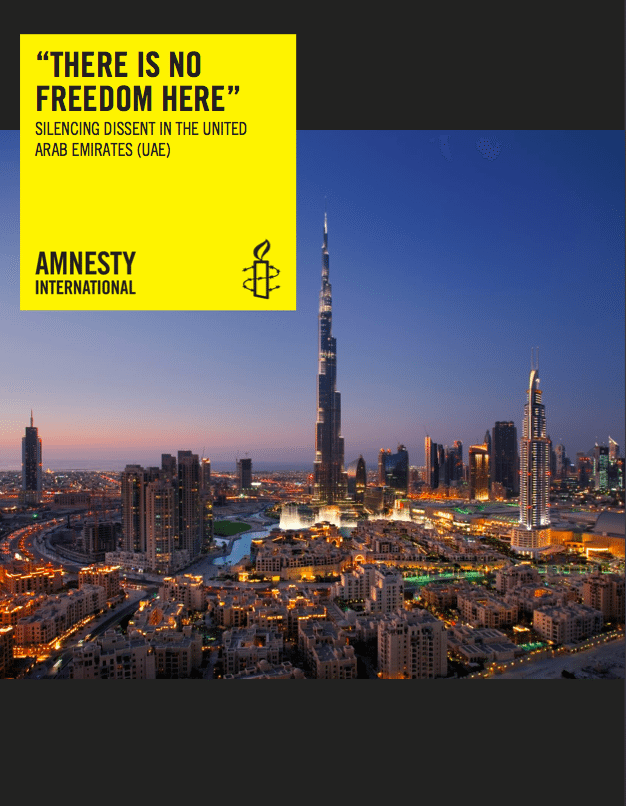Scores of activists in the United Arab Emirates (UAE) have been harassed, arrested and in some cases tortured in custody according to a new report by Amnesty International that sheds light on the repressive tactics widely used by the government to silence its critics.
“There is No Freedom Here:" Silencing Dissent in the UAE lifts the lid on the climate of fear that has taken hold in the country since 2011, with the authorities going to extreme lengths to stamp out any sign of dissent, criticism or calls for reform in the wake of the mass popular uprisings in the Middle East and North Africa.
Those targeted include lawyers, university professors, students and civil society activists, some of whom are linked to the Reform and Social Guidance Association (al-Islah), a peaceful grassroots organization that the government claims has links to Egypt’s Muslim Brotherhood. The clampdown has also targeted their family members.
The report, published ahead of the Formula One Grand Prix in Abu Dhabi, exposes the huge gulf between the public image the UAE tries to project of a dynamic, modern and burgeoning economic power, home to luxury hotels, skyscrapers and designer shopping malls; and the darker reality of activists routinely persecuted and subjected to enforced disappearance, torture and other ill-treatment.
The clampdown on dissent was sparked by a petition from a group of 133 people addressed to the authorities in March 2011, calling for political reform and for the right to vote and elect a parliament.
More than 100 peaceful activists and government critics have been prosecuted or jailed for politically motivated national security or cybercrimes offences since then. More than 60 of them continue to languish in prison, serving sentences of up to 14 years.
Amnesty International’s report details how these men and their families have been intimidated or arbitrarily arrested and imprisoned by the authorities.
Among them is prisoner of conscience Dr Mohammed al-Roken, a prominent human rights lawyer who had for years been a target of government harassment because of his criticism of the UAE’s human rights record and his advocacy for democratic reforms. He is serving a 10-year prison sentence following a deeply flawed mass trial of 94 activists before the State Security Chamber of the Federal Supreme Court –widely known as the “UAE 94”trial.
In another emblematic case, 25-year-old activist Osama al-Najjar was arrested in March 2014 after he expressed, in comments posted on Twitter, concern over the ill-treatment of his father, Hussain Ali al-Najjar al-Hammadi, and other political prisoners held at al-Razeen Prison in Abu Dhabi. After his arrest, he was held in solitary confinement where he says he was punched and beaten repeatedly all over his face and body and threatened with electric shocks.
His father is serving a total of 11 years’imprisonment after being convicted under vaguely-worded national security charges following two unfair mass trials. He was held in solitary confinement for eight months in conditions amounting to enforced disappearance following his arrest in 2012.
Amnesty International is calling on the UAE authorities to urgently overhaul laws that criminalize the peaceful exercise of the rights to freedom of expression and association, including the cybercrimes law and a repressive new anti-terrorism law passed in August 2014.
Some of those jailed said they were tortured and ill-treated, describing how interrogators had pulled out their fingernails; beaten them severely and suspended them upside down for long periods; torn hair from their beards and chests; and threatened them with electric shock torture, rape and death.
Amnesty International is urging the UAE authorities to publicly condemn torture and take effective measures to prohibit and prevent all forms of torture and other ill-treatment, as well as to independently and impartially investigate all allegations of torture and hold perpetrators to account.
The “UAE 94”trial was marred by irregularities and its proceedings were deeply flawed and unfair. The justice system in the UAE is neither independent nor impartial, with courts often appearing to do little more than rubber stamp the decisions of the UAE executive. Defendants are often denied access to lawyers and the right to appeal their verdict. In many cases proceedings have relied on forced “confessions”to convict defendants, in contravention of international human rights law.
Harassment and intimidation tactics employed by the authorities also include revoking the nationality of activists and punishing their families by appearing to block their access to career or educational opportunities.
The UAE authorities responded to the concerns raised by Amnesty International in this report to say that the promotion of human rights is an “ongoing process."

